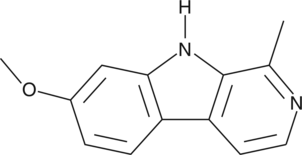Description
Harmine is a β-carboline alkaloid that was first isolated from seeds of Peganum harmala (Syrian rue) and Banisteriopsis caapi. Recent work indicates that harmine is a unique regulator of PPARγ expression that acts by inhibiting the Wnt signalling pathway in a cell-specific manner.{14921} Administration of harmine (30 mg/kg) to obese db/db mice resulted in reduced blood glucose, free fatty acids, and triglyceride levels, delayed hyperglycemia, and improved insulin sensitivity. Harmine also attenuates inflammatory gene expression (TNFα, IL-1β, iNOS) and macrophage accumulation in adipose tissue.{14921}
Formal name: 7-methoxy-1-methyl-9H-pyrido[3,4-b]indole
Synonyms:
Molecular weight: 212.3
CAS: 442-51-3
Purity: ≥98%
Formulation: A crystalline solid
Application|Mass Spectrometry||Product Type|Biochemicals|Natural Products|Alkaloids||Research Area|Cell Biology|Cell Signaling|Wnt Signaling||Research Area|Endocrinology & Metabolism|Hormones & Receptors|PPARs||Research Area|Endocrinology & Metabolism|Metabolic Diseases|Diabetes||Research Area|Endocrinology & Metabolism|Metabolic Diseases|Dyslipidemias||Research Area|Endocrinology & Metabolism|Metabolic Diseases|Obesity




